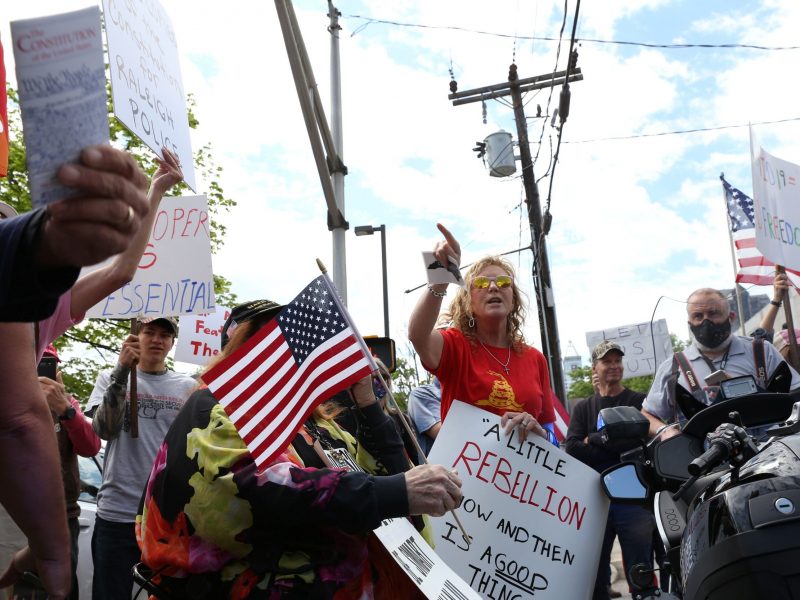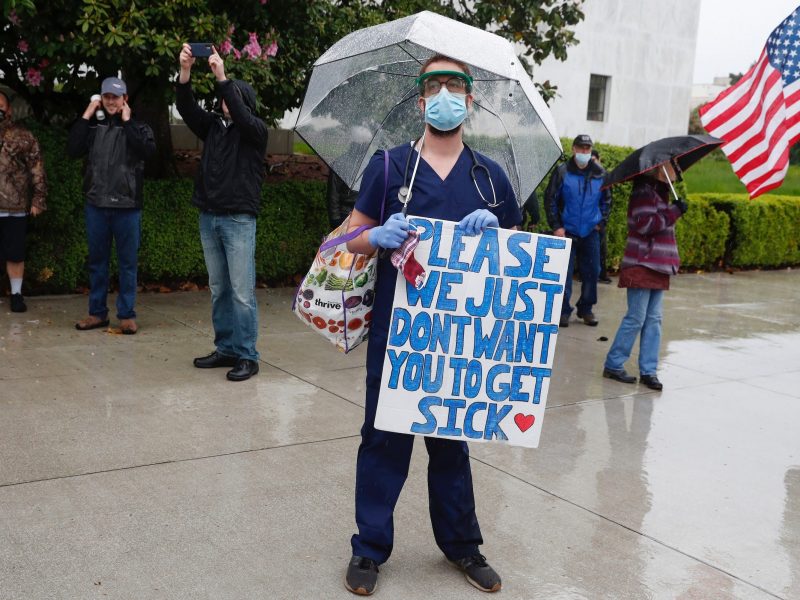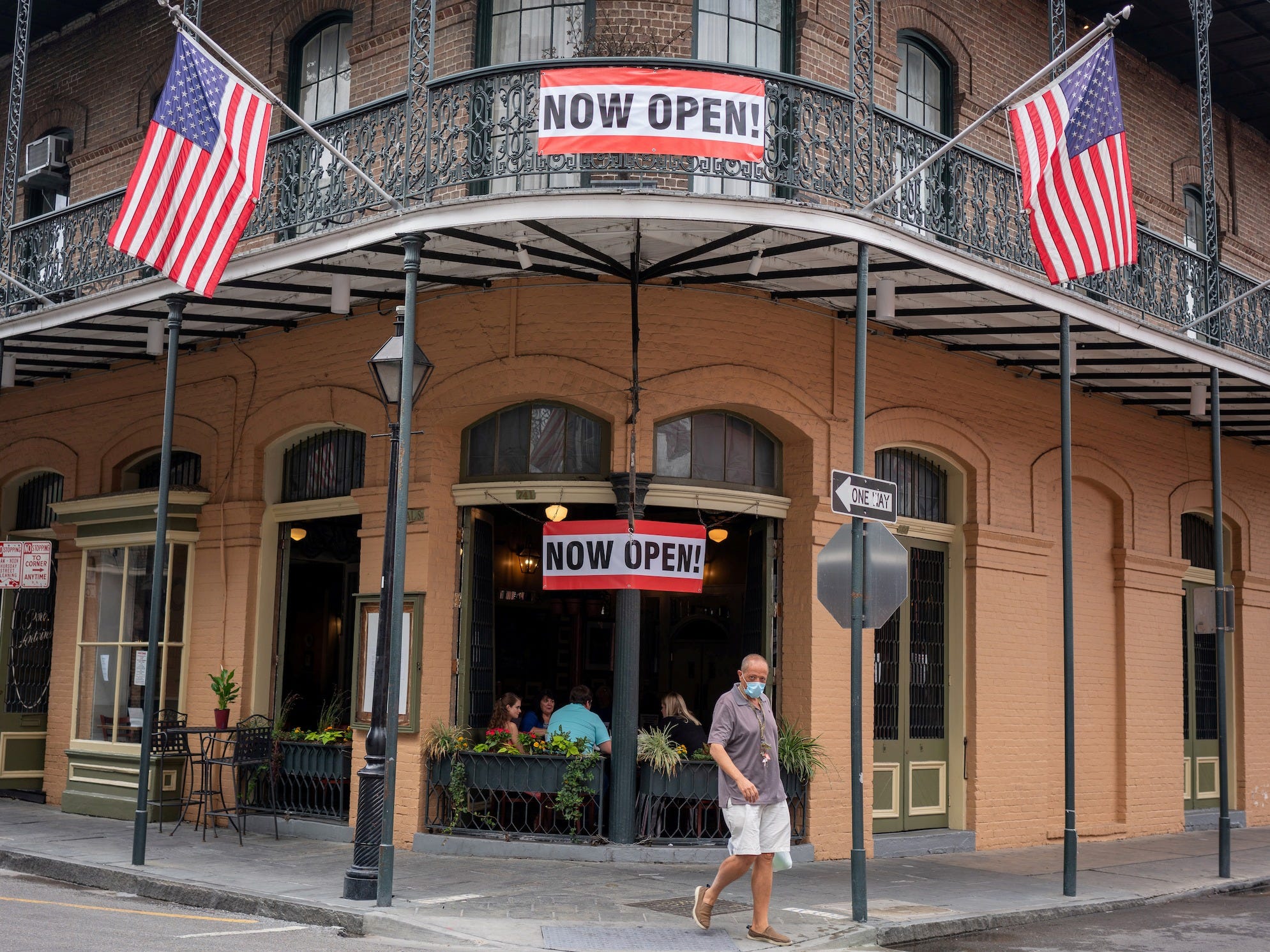- Arizona and Florida are closing bars ahead of the Fourth of July weekend, Texas is rolling back its reopening, and California has shuttered nightlife as coronavirus cases in the states climb steeply.
- Many states have seen surges in COVID-19 cases after reopening, leading state and city officials to reimpose restrictions or delay next steps.
- Here are the 15 states and cities that have slowed or backtracked their reopenings so far.
- Visit Business Insider’s homepage for more stories.
As the US opens back up, the coronavirus is taking advantage of the new opportunities to spread.
As of Monday, at least 32 states are seeing increases in daily coronavirus cases. The inclines are particularly steep in a number of Southern states, including Florida, Mississippi, South Carolina, and Texas. Many are reporting more cases than they’ve ever seen on a daily basis.
“This is a continuation of the first wave,” Dr. Amesh Adalja, a senior scholar at the Johns Hopkins University Center for Health Security, told Business Insider. “Some places that might have been relatively spared early on in the winter and the spring are now facing cases higher than they had before.”
As a result, many states and cities are dialing back their reopening efforts, reverting to earlier phases or postponing next steps.
Here are the places that are slowing down or walking back their reopening plans.
Arizona Gov. Doug Ducey just ordered bars, gyms, movie theaters, water parks, and tubing businesses to close again. It was the latest in a series of leaders' decisions to delay or reverse lockdown lifts.

Ducey's executive order, released on Monday, is set to last through at least July 27. The order cited an "exponential pace" of the virus's spread, especially among people ages 20 to 44.
"There has not been sufficient time for mask mandates and limiting groups to have a demonstrable effect on containing the spread," the order read. "Additional measures need to be taken to ensure quicker containment."
Ducey also announced that Arizona schools will not reopen for in-person classes until at least August 17 - a couple weeks later than is standard.
Arizona's average daily case count has increased fivefold since the beginning of June. The state saw 3,809 new cases on Sunday alone.
Ducey said Thursday that 1 in 5 Arizona coronavirus tests are coming back positive.
Will Humble, the former director of the Arizona Department of Health Services, said in early June that the surge in new cases was "definitely related" to the lifted stay-at-home order.
Texas Gov. Greg Abbott rolled back his state's reopening plan, closing businesses and restoring restrictions on restaurants and gatherings.

Abbott announced a pause in reopening on Thursday, saying businesses that have already reopened would be allowed to continue operating at limited capacity. Then on Friday, he shifted course, shuttering bars, limiting restaurant capacity to 50%, closing tubing and rafting businesses, and mandating government approval for gatherings of 100 or more people.
The renewed restrictions came as Texas reported that more than 10% of its COVID-19 tests are coming back positive.
"The rise in cases is largely driven by certain types of activities, including Texans congregating in bars," Abbott said in a statement. "The actions in this executive order are essential to our mission to swiftly contain this virus and enhance public health. We want this to be as limited in duration as possible."
Texas was one of the first states in the country to start reopening from its coronavirus lockdown in early May. The state has seen a surge in cases since then.
On June 23 alone, more than 5,000 new cases were reported in Texas - a number Abbott described as a "massive outbreak." The next day, the state reported more than 6,500 more cases.
Dr. Peter Hotez, who is working on developing a COVID-19 vaccine, called Texas's situation "absolutely horrifying." He told the BBC that what's unfolding there is a "humanitarian catastrophe."
California has shuttered bars and nightlife in seven counties as cases surge in Los Angeles and the Central Valley.

On Sunday, Gov. Gavin Newsom ordered bars and nightlife to close in Fresno, Imperial, Kern, Kings, Los Angeles, San Joaquin, and Tulare counties. He recommended that such businesses close in eight other counties: Contra Costa, Riverside, Sacramento, San Bernardino, Santa Barbara, Santa Clara, Stanislaus, and Ventura.
"Californians must remain vigilant against this virus," Newsom said in a statement. "COVID-19 is still circulating in California, and in some parts of the state, growing stronger. That's why it is critical we take this step to limit the spread of the virus in the counties that are seeing the biggest increases."
Florida regulators suspended drinking at bars after the state reported nearly 9,000 new cases in one day.

Halsey Beshears, Secretary of Florida's Department of Business and Professional Regulation, tweeted Friday that on-site alcohol consumption at bars is suspended across the state, "effective immediately."
The new restriction came after Florida reported a record 8,933 new COVID-19 cases on Thursday - nearly double the case count from the previous day. When the state began reopening in early May, its daily new case counts were below 1,000.
In Miami-Dade County, 27% of COVID-19 tests were coming back positive last week.
Gov. Ron DeSantis previously showed little interest in pausing or rolling back new reopenings.
"We are where we are," DeSantis told reporters on Thursday. "I didn't say we were going to go on to the next phase."
Miami-Dade, Broward, and Palm Beach counties have also decided to close their beaches for the Fourth of July weekend.
Washington has barred its counties from moving into phase 4 of reopening.

Gov. Jay Inslee announced Saturday that the state is "putting a pause" on moving counties to the final phase of reopening, leaving eight eligible counties in limbo.
According to the state's plan, which allows counties to reopen at different paces, phase 4 would allow all recreational activity, non-essential travel, gatherings of more than 50 people, and the reopening of nightclubs, concert venues, and large sporting events with certain precautions.
"Phase 4 would mean a return to normal activity, and we can't do that now due to the continued rise in cases across the state," Inslee said in a statement about the new order. "We all want to get back to doing all the things we love in Washington during the summer, and fully open our economy, but we aren't there yet."
Inslee has also instituted a statewide face mask mandate for anyone in public spaces.
Louisiana postponed its next reopening phase by a month.

The state will continue in phase 2 - which allows most businesses and places of worship to operate at half capacity with social distancing - for at least another 28 days, Gov. John Bel Edwards announced on June 22. He added that officials would do "another deep data dive" in two weeks to determine whether the state was ready to move on to phase 3.
"This is not the direction we want to be headed in," Edwards said, according to WWL-TV. "We need to do a better job of wearing masks when we aren't at home."
Edwards added that the rise in cases is "more than can be fairly attributed to the growth in testing," especially since hospitalizations have risen steeply alongside case counts.
Louisiana has reported more than 53,400 cases and 3,100 deaths as of Friday.
North Carolina, too, has paused its plans to move to phase 3.

On Wednesday, Gov. Roy Cooper announced that the state would remain in phase 2 for another three weeks. He also mandated face masks in public places.
"North Carolina is relying on the data and the science to lift restrictions responsibly, and right now our increasing numbers show we need to hit the pause button while we work to stabilize our trends," Cooper said in a statement.
Delaware was set to move into phase 3 on Monday, but Gov. John Carney has said he wants to "get a better handle on what's going on" first.

Carney announced Thursday that the state will remain in phase 2 for the foreseeable future, with expanded outdoor seating at restaurants, appointment-only retail, open beaches, and outdoor gatherings of up to 250 people permitted.
"Too many Delawareans and visitors are not following basic public health precautions. We've heard and seen concerns especially in our beach communities, in restaurants, in gyms, and at sporting events," Carney said in a statement.
Unlike most other states reimposing restrictions, Delaware has not exceeded the daily case counts that it reported in April and May. The new measure seems mostly precautionary.
"In Delaware, we are beating this disease. We have flattened the curve. But that's because Delawareans stayed home and made significant sacrifices to keep others safe," Carney said. "Make no mistake: COVID-19 has not gone away. We've seen what has happened in other states when folks let their guard down. Let's not be one of those states."
Nevada is also waiting a few more weeks before considering phase 3.

Since the state reopened its casinos in early June, Nevada's seven-day average case count has risen steeply, quickly outpacing previous months.
That showed the state was "not ready" for phase 3, Gov. Steve Sisolak said when he announced the phase's postponement on June 15.
According to White House guidelines, phase 3 could allow employers to bring staff back into work without restrictions, reopen senior care facilities and hospitals to visitors, increase occupancy for bars, and allow sporting venues and movie theaters to reopen.
"Nevadans have made enormous sacrifices to get us to where we are today," Sisolak said in a press conference. "I don't want to let that all go for naught by us having to take a giant step backwards."
Nevada's case count has risen by 41% in the last two weeks.
Maine has postponed the reopening of indoor bars.

The state's initial reopening plan called for bars to resume indoor service starting July 1. But on June 22, Gov. Janet Mills put that plan on the back-burner "until further notice."
Bars in Maine can continue outdoor service, and restaurants that have bars can continue seating guests inside with proper social distancing and capacity limitations.
"Indoor bar service typically features crowds, often in close contact with one another, often without tables or other ways of keeping people apart," Jeanne Lambrew, commissioner of the Maine Department of Health and Human Services, said of the announcement, according to the Portland Press-Herald. "Smaller spaces in many bars makes physically distancing very difficult. Further, individuals may be less likely to wear cloth face coverings in bars."
Coronavirus outbreaks in Michigan, Idaho, and Louisiana have been linked to indoor groups of patrons at bars.
New Jersey indefinitely postponed indoor dining, which was set to resume on July 2.

"It brings me no joy to do this, but we have no choice," Gov. Phil Murphy said in a press briefing on Monday.
Murphy tweeted that his government had made the decision after indoor dining had spurred outbreaks in other states. He also said that some bars and restaurants across New Jersey had been violating guidelines.
"Overcrowding. A complete disregard for social distancing. Very few, IF ANY, face coverings," he wrote on Twitter. "The carelessness of one establishment can completely undo the good work of many others."
Oregon halted all new reopenings for a week in mid-June, and recently mandated face masks in indoor public places for most residents.

"This is essentially a statewide 'yellow light,'" Gov. Kate Brown said in a statement when she announced the temporary pause on county reopenings. "This one-week pause will give public-health experts time to assess what factors are driving the spread of the virus and determine if we need to adjust our approach to reopening."
As of Wednesday, people in seven of Oregon's most populous counties are required to wear face masks in stores and other indoor public places.
Idaho is "tapping on the breaks," Gov. Brad Little announced on Thursday.

The state did not meet its own criteria for the final stage of reopening, Little said in a press conference.
The state's epidemiologist, Dr. Christine Hahn, said emergency rooms in Idaho are seeing more and more patients with coronavirus-like symptoms. She added that more healthcare workers are testing positive as well.
Twice this week, Idaho's daily new case count has surpassed its previous peak from April, with hundreds of new people testing positive.
Idaho will remain in Stage 4 for at least two more weeks, ensuring that businesses maintain social distancing protocols and employers make accommodations for workers vulnerable to severe infection.
In two weeks, Little said, "we'll examine the numbers again."
Boise and its surrounding county had already reversed course, reverting to an earlier stage of the reopening plan and shuttering bars and nightclubs.

Ada County, which encompasses the city of Boise, broke course with the rest of Idaho and reverted to stage 3 on Monday.
The reversal forced bars and nightclubs to close again, reinstated work-from-home recommendations, and limited gatherings to fewer than 50 people.
The area has seen little transmission of the virus in the last few months, with fewer than 10 people testing positive each day, but that changed abruptly in recent weeks. Ada County has seen 579 new cases since June 15.
San Francisco delayed its plans to reopen hair and nail salons, tattoo parlors, outdoor bars and swimming pools, zoos, aquariums, and museums.

The city was scheduled to move into the next phase of its reopening plan on Monday.
But on Friday, Mayor London Breed announced that those plans would have to wait, since the city had reported 103 new cases the day before. Just 10 days earlier, when indoor retail resumed, the daily new case count was just 35.
"At our current rate, the number could double rapidly," Breed said on Twitter. "If that continues and we don't intervene, we'll be at such a high number that our only option would be to shut down."
She added: "I know people are anxious to reopen - I am too. But we can't jeopardize the progress we've made."
